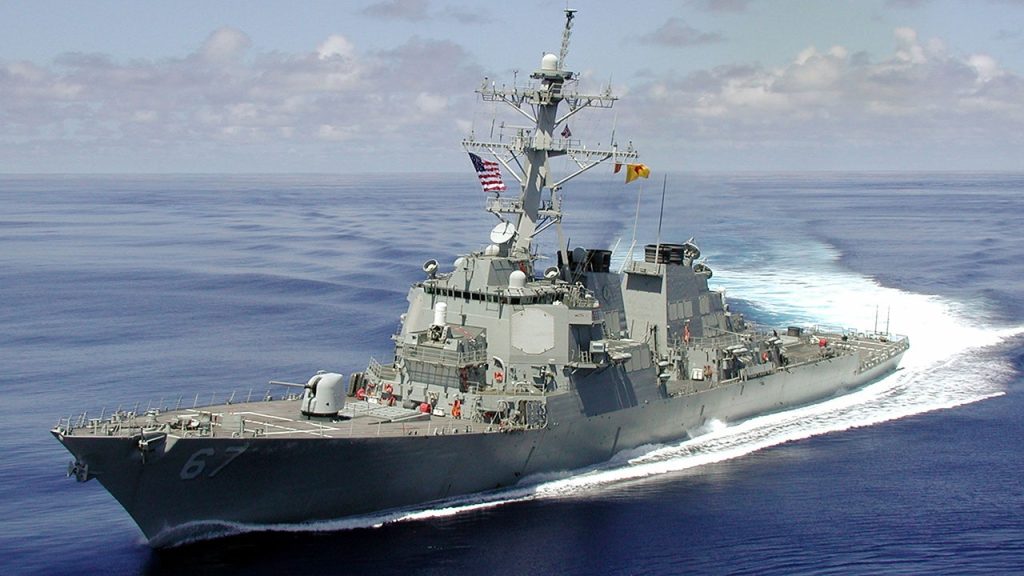In a continued effort to bolster border security, the U.S. Navy has dispatched a third destroyer, the USS Cole, to the southern border. This move aims to assist in the ongoing operations against illegal immigration and drug smuggling across the U.S.-Mexico boundary. The USS Cole joins two other destroyers already stationed in the region, enhancing surveillance and interception capabilities as authorities intensify their response to transnational crime.
| Article Subheadings |
|---|
| 1) Overview of the Mission |
| 2) Details of the USS Cole Deployment |
| 3) Previous Operations by the USS Gravely |
| 4) The Role of the Coast Guard |
| 5) Future Projections and Implications |
Overview of the Mission
The U.S. Navy is actively orchestrating naval support for border security as part of a broader mission to combat unlawful immigration and drug trafficking across the U.S.-Mexico border. This multi-faceted operation underscores the government’s priority to enhance national security through the collaboration of military and law enforcement agencies. In recent years, illegal immigration and narcotics smuggling have escalated into pressing national concerns, prompting a defensive maneuver by military assets. The deployment signifies a strategic approach to integrate military capabilities into domestic law enforcement efforts, aiming to deter illicit activities effectively.
Details of the USS Cole Deployment
The USS Cole, an Arleigh Burke-class guided-missile destroyer, embarked from Mayport, Florida, to provide additional support for U.S. Northern Command’s (NORTHCOM) operational objectives. This assignment includes not only patrolling the Gulf of Mexico but also collaborating closely with the U.S. Coast Guard to intercept potential drug trafficking operations. The vessel will take over responsibilities from the USS Gravely, which has been involved in similar operations since its deployment.
The USS Cole is equipped with advanced radar and surveillance systems, enabling it to monitor wide areas over sea and air. This enhanced detection capability is crucial in identifying illicit movements before they can reach U.S. shores. As practices evolve in combating smuggling, cooperation between naval forces and specialized Coast Guard units is vital for operational success.
Previous Operations by the USS Gravely
Before the arrival of the USS Cole, the USS Gravely had been conducting extensive patrols in the Caribbean and Gulf regions. Notably, the USS Gravely successfully intercepted approximately 860 pounds of illegal narcotics in late May, working closely with a Coast Guard Law Enforcement Detachment (LEDET). This incident demonstrates the ongoing commitment and effectiveness of naval operations against drug trafficking syndicates.
Such successful interdictions not only protect the integrity of U.S. borders but also impact international drug trade routes. The ship’s crew, alongside Coast Guard operatives, executed a boarding operation which led to the seizure of 19 bales of cocaine valued at over $13.6 million. These successful missions also highlight the vital role of naval forces in mitigating threats and supporting domestic law enforcement operations in the region.
The Role of the Coast Guard
The collaboration between the Navy and the Coast Guard represents an integrated approach to border security. As illegal immigration and drug-related crime continue to evolve, specialized Coast Guard teams are onboard destroyers like the USS Cole and USS Gravely to enhance field operations. These teams bring law enforcement expertise, enabling them to conduct effective maritime patrols, boarding actions, and surveillance activities.
According to Capt. Raymond Jackson, commanding officer of the Coast Guard Tactical Law Enforcement Team South, these joint operations are essential for improving deterrence and reinforcing protective measures along U.S. borders. Such cooperation also promises strengthened intelligence gathering and rapid response capabilities to emerging threats in maritime environments.
Future Projections and Implications
As the U.S. exercises its military assets along the southern border, future operations will likely benefit from the lessons learned in previous engagements. The deployment of the USS Cole, along with the continued presence of other destroyers, indicates a sustained military commitment to border security, particularly as drug trafficking becomes increasingly sophisticated. Additionally, the military’s involvement is anticipated to evolve with advancements in technology and surveillance methodologies.
Moreover, ongoing missions involving naval assets will likely ensure greater cooperation with federal and state law enforcement agencies, emphasizing a newly integrated approach towards homeland security. This not only enhances operational efficacy but also underscores the necessity of holistic cooperation in addressing complex threats that impact national safety and public welfare.
| No. | Key Points |
|---|---|
| 1 | The USS Cole is deployed to support border security operations against drug trafficking. |
| 2 | The previous destroyer, USS Gravely, has already engaged in significant narcotics interdiction. |
| 3 | Joint operations between the Navy and Coast Guard enhance intelligence and law enforcement capabilities. |
| 4 | Naval operations contribute significantly to U.S. efforts to combat illegal immigration. |
| 5 | Future deployments may leverage emerging technologies for improved surveillance and security measures. |
Summary
The strategic deployment of the USS Cole reflects the U.S. government’s commitment to enhancing security measures along the southern border. By utilizing naval forces alongside Coast Guard units, authorities aim to effectively tackle the complex issues of illegal immigration and drug trafficking. As operations continue to unfold, the integrated approach emphasizes the importance of collaboration and adaptability in safeguarding national security.
Frequently Asked Questions
Question: Why are Navy ships deployed to the southern border?
Navy ships are deployed to support border security efforts by monitoring maritime activities and assisting in interdiction operations against illegal immigration and drug smuggling.
Question: What is the role of the Coast Guard in these operations?
The Coast Guard works alongside Navy vessels to enhance law enforcement capabilities, conduct surveillance, and perform boarding actions during anti-trafficking operations.
Question: What impact do these naval operations have on drug trafficking?
These naval operations disrupt drug trafficking routes and deter illegal activities, enhancing national security and contributing to the safety of communities across the U.S.


